The Legal Accountability of External Auditors Regarding Client Fraud
VerifiedAdded on 2023/06/04
|14
|3368
|340
Report
AI Summary
This report investigates the legal accountability of external auditors for the consequences of client fraud, supported by historical developments in regulations and laws. It emphasizes that while auditors should be aware of fraud's impact on financial statements, their primary responsibility is not fraud detection, which lies with the management. The report argues that auditors are not legally responsible for detecting client fraud unless negligence is proven, requiring the client to demonstrate both negligence and actual loss incurred. Cases and historical developments, such as the Singapore Accountancy Convention (SAC) and relevant court cases like Swynson v Lowick Rose, are discussed to illustrate the limited legal duty of auditors in detecting client crime unless negligence is evident.
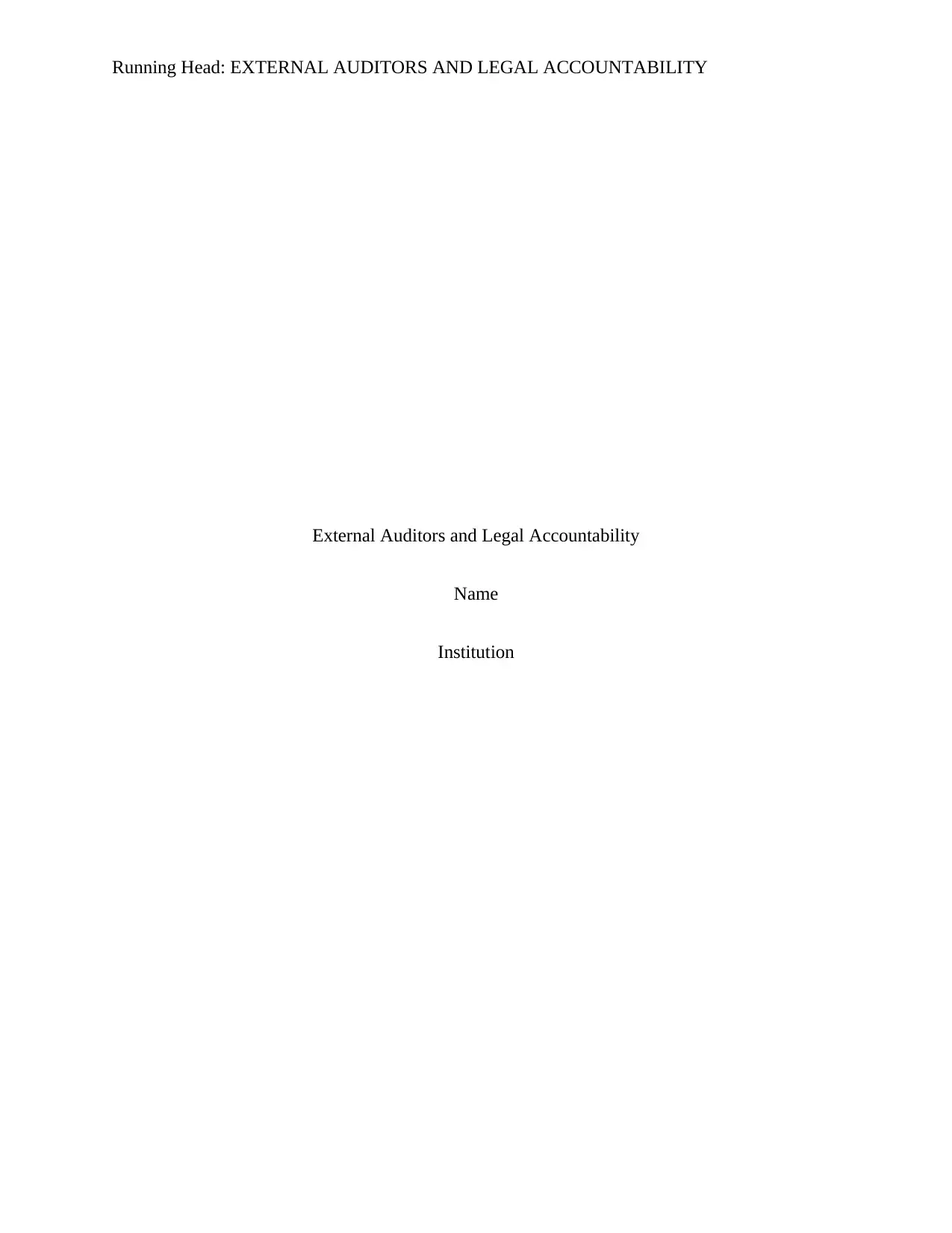
Running Head: EXTERNAL AUDITORS AND LEGAL ACCOUNTABILITY
External Auditors and Legal Accountability
Name
Institution
External Auditors and Legal Accountability
Name
Institution
Paraphrase This Document
Need a fresh take? Get an instant paraphrase of this document with our AI Paraphraser
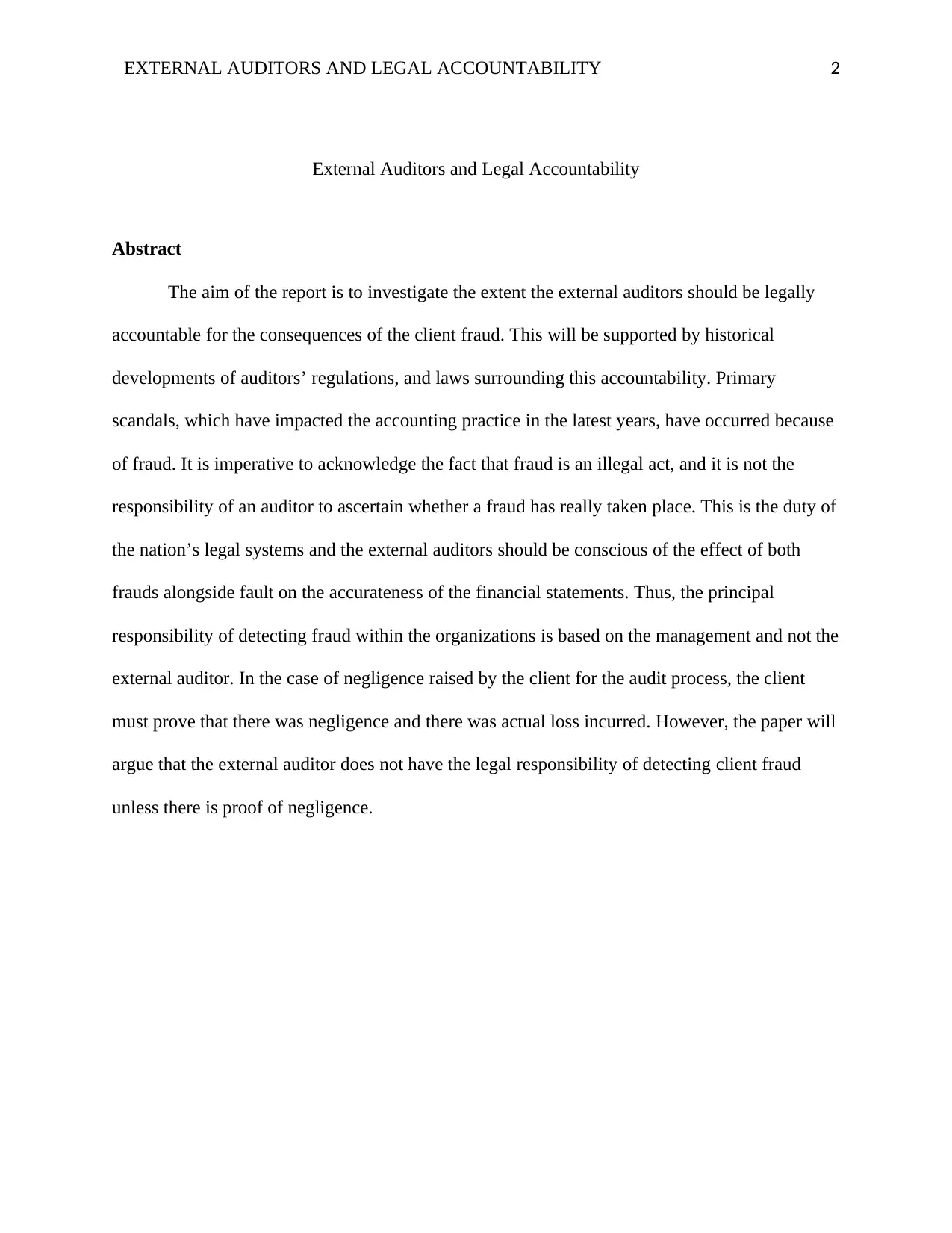
EXTERNAL AUDITORS AND LEGAL ACCOUNTABILITY 2
External Auditors and Legal Accountability
Abstract
The aim of the report is to investigate the extent the external auditors should be legally
accountable for the consequences of the client fraud. This will be supported by historical
developments of auditors’ regulations, and laws surrounding this accountability. Primary
scandals, which have impacted the accounting practice in the latest years, have occurred because
of fraud. It is imperative to acknowledge the fact that fraud is an illegal act, and it is not the
responsibility of an auditor to ascertain whether a fraud has really taken place. This is the duty of
the nation’s legal systems and the external auditors should be conscious of the effect of both
frauds alongside fault on the accurateness of the financial statements. Thus, the principal
responsibility of detecting fraud within the organizations is based on the management and not the
external auditor. In the case of negligence raised by the client for the audit process, the client
must prove that there was negligence and there was actual loss incurred. However, the paper will
argue that the external auditor does not have the legal responsibility of detecting client fraud
unless there is proof of negligence.
External Auditors and Legal Accountability
Abstract
The aim of the report is to investigate the extent the external auditors should be legally
accountable for the consequences of the client fraud. This will be supported by historical
developments of auditors’ regulations, and laws surrounding this accountability. Primary
scandals, which have impacted the accounting practice in the latest years, have occurred because
of fraud. It is imperative to acknowledge the fact that fraud is an illegal act, and it is not the
responsibility of an auditor to ascertain whether a fraud has really taken place. This is the duty of
the nation’s legal systems and the external auditors should be conscious of the effect of both
frauds alongside fault on the accurateness of the financial statements. Thus, the principal
responsibility of detecting fraud within the organizations is based on the management and not the
external auditor. In the case of negligence raised by the client for the audit process, the client
must prove that there was negligence and there was actual loss incurred. However, the paper will
argue that the external auditor does not have the legal responsibility of detecting client fraud
unless there is proof of negligence.
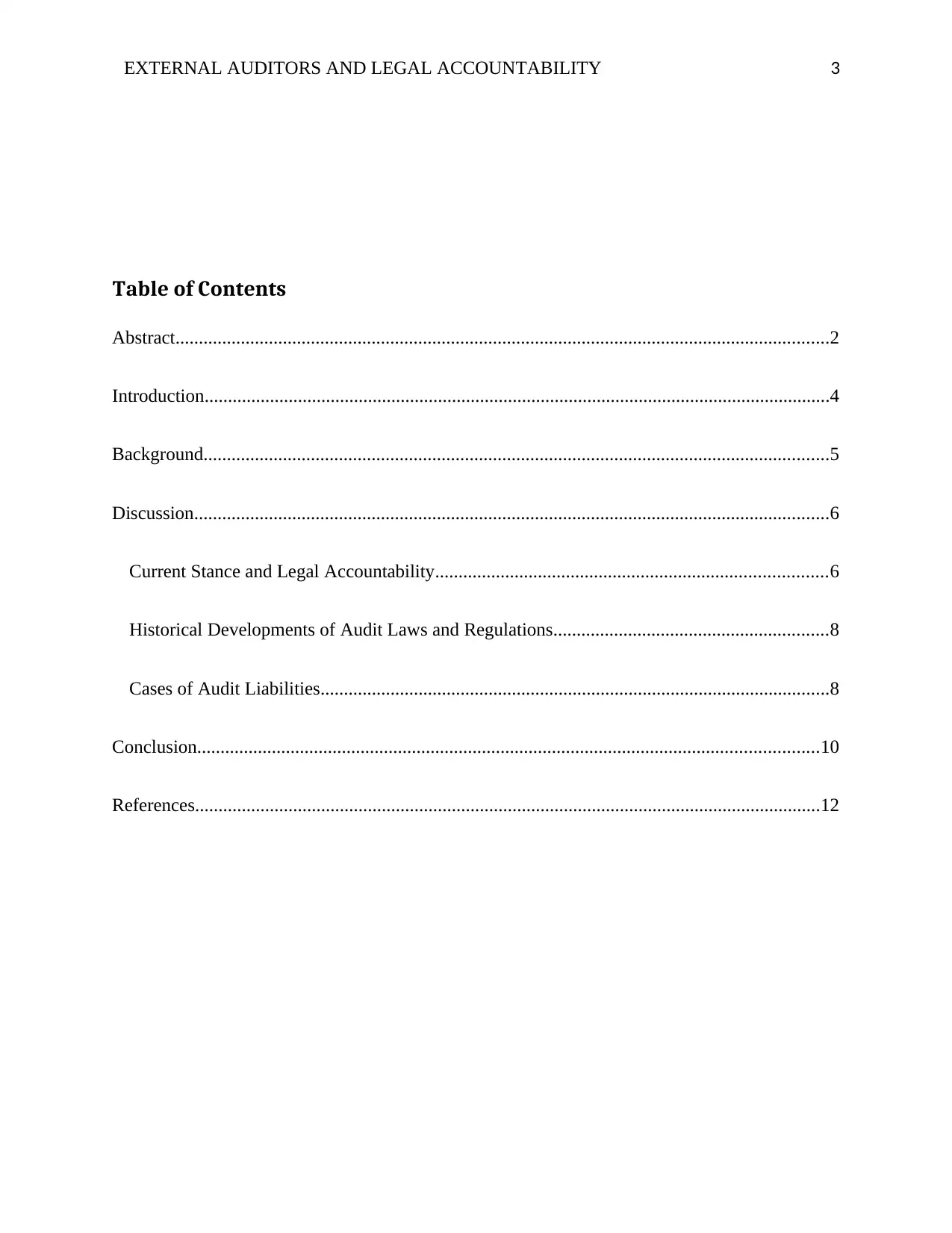
EXTERNAL AUDITORS AND LEGAL ACCOUNTABILITY 3
Table of Contents
Abstract............................................................................................................................................2
Introduction......................................................................................................................................4
Background......................................................................................................................................5
Discussion........................................................................................................................................6
Current Stance and Legal Accountability....................................................................................6
Historical Developments of Audit Laws and Regulations...........................................................8
Cases of Audit Liabilities.............................................................................................................8
Conclusion.....................................................................................................................................10
References......................................................................................................................................12
Table of Contents
Abstract............................................................................................................................................2
Introduction......................................................................................................................................4
Background......................................................................................................................................5
Discussion........................................................................................................................................6
Current Stance and Legal Accountability....................................................................................6
Historical Developments of Audit Laws and Regulations...........................................................8
Cases of Audit Liabilities.............................................................................................................8
Conclusion.....................................................................................................................................10
References......................................................................................................................................12
⊘ This is a preview!⊘
Do you want full access?
Subscribe today to unlock all pages.

Trusted by 1+ million students worldwide
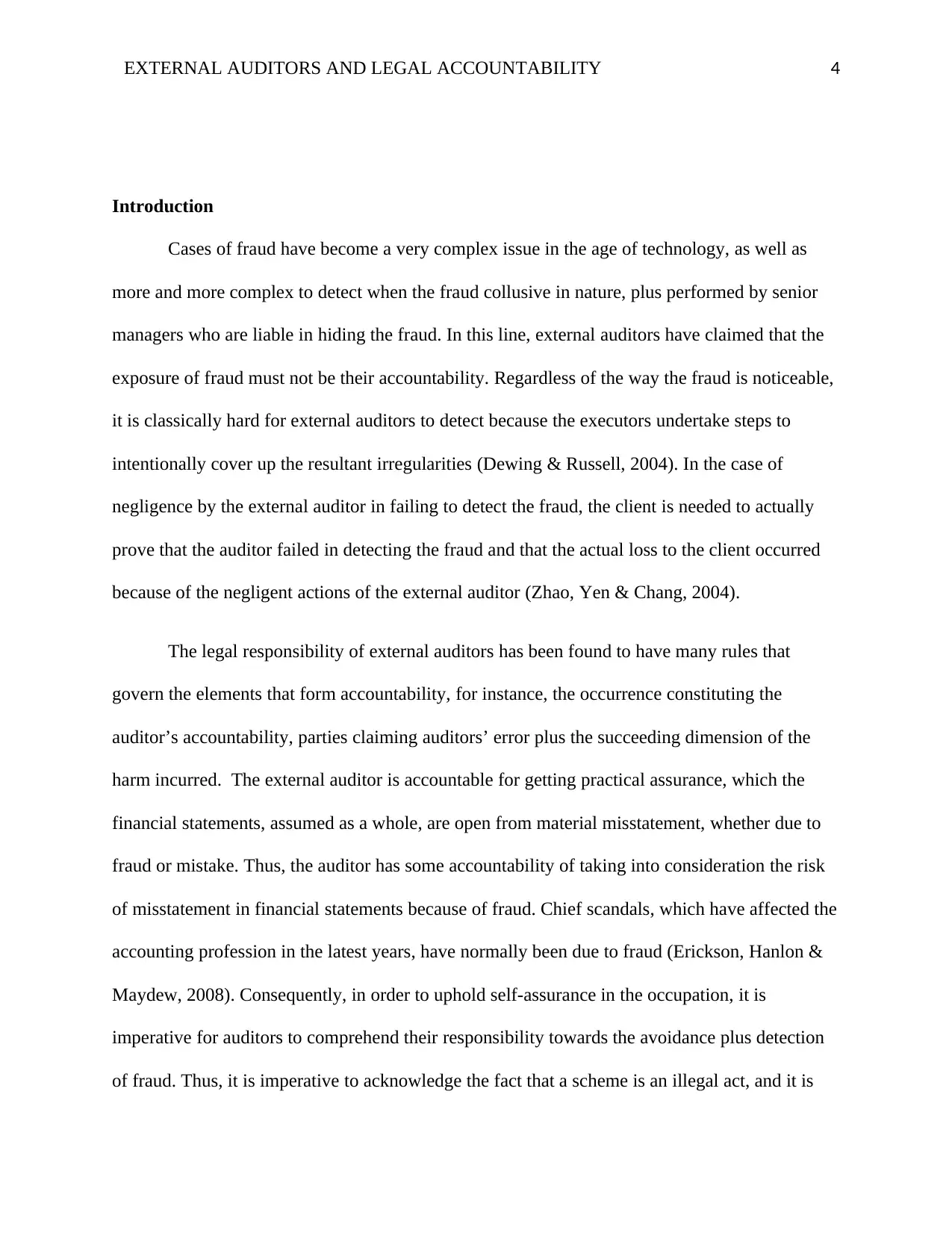
EXTERNAL AUDITORS AND LEGAL ACCOUNTABILITY 4
Introduction
Cases of fraud have become a very complex issue in the age of technology, as well as
more and more complex to detect when the fraud collusive in nature, plus performed by senior
managers who are liable in hiding the fraud. In this line, external auditors have claimed that the
exposure of fraud must not be their accountability. Regardless of the way the fraud is noticeable,
it is classically hard for external auditors to detect because the executors undertake steps to
intentionally cover up the resultant irregularities (Dewing & Russell, 2004). In the case of
negligence by the external auditor in failing to detect the fraud, the client is needed to actually
prove that the auditor failed in detecting the fraud and that the actual loss to the client occurred
because of the negligent actions of the external auditor (Zhao, Yen & Chang, 2004).
The legal responsibility of external auditors has been found to have many rules that
govern the elements that form accountability, for instance, the occurrence constituting the
auditor’s accountability, parties claiming auditors’ error plus the succeeding dimension of the
harm incurred. The external auditor is accountable for getting practical assurance, which the
financial statements, assumed as a whole, are open from material misstatement, whether due to
fraud or mistake. Thus, the auditor has some accountability of taking into consideration the risk
of misstatement in financial statements because of fraud. Chief scandals, which have affected the
accounting profession in the latest years, have normally been due to fraud (Erickson, Hanlon &
Maydew, 2008). Consequently, in order to uphold self-assurance in the occupation, it is
imperative for auditors to comprehend their responsibility towards the avoidance plus detection
of fraud. Thus, it is imperative to acknowledge the fact that a scheme is an illegal act, and it is
Introduction
Cases of fraud have become a very complex issue in the age of technology, as well as
more and more complex to detect when the fraud collusive in nature, plus performed by senior
managers who are liable in hiding the fraud. In this line, external auditors have claimed that the
exposure of fraud must not be their accountability. Regardless of the way the fraud is noticeable,
it is classically hard for external auditors to detect because the executors undertake steps to
intentionally cover up the resultant irregularities (Dewing & Russell, 2004). In the case of
negligence by the external auditor in failing to detect the fraud, the client is needed to actually
prove that the auditor failed in detecting the fraud and that the actual loss to the client occurred
because of the negligent actions of the external auditor (Zhao, Yen & Chang, 2004).
The legal responsibility of external auditors has been found to have many rules that
govern the elements that form accountability, for instance, the occurrence constituting the
auditor’s accountability, parties claiming auditors’ error plus the succeeding dimension of the
harm incurred. The external auditor is accountable for getting practical assurance, which the
financial statements, assumed as a whole, are open from material misstatement, whether due to
fraud or mistake. Thus, the auditor has some accountability of taking into consideration the risk
of misstatement in financial statements because of fraud. Chief scandals, which have affected the
accounting profession in the latest years, have normally been due to fraud (Erickson, Hanlon &
Maydew, 2008). Consequently, in order to uphold self-assurance in the occupation, it is
imperative for auditors to comprehend their responsibility towards the avoidance plus detection
of fraud. Thus, it is imperative to acknowledge the fact that a scheme is an illegal act, and it is
Paraphrase This Document
Need a fresh take? Get an instant paraphrase of this document with our AI Paraphraser
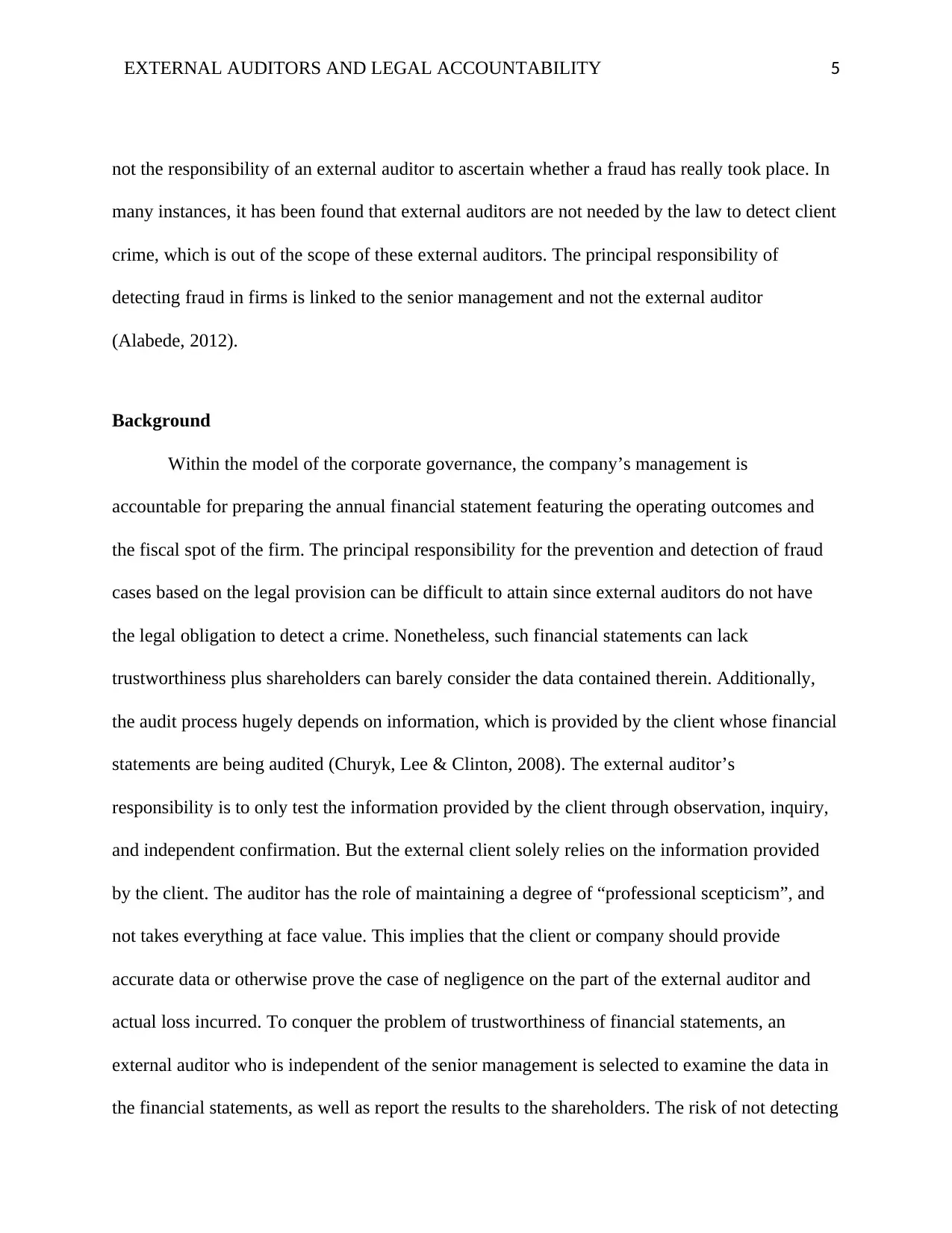
EXTERNAL AUDITORS AND LEGAL ACCOUNTABILITY 5
not the responsibility of an external auditor to ascertain whether a fraud has really took place. In
many instances, it has been found that external auditors are not needed by the law to detect client
crime, which is out of the scope of these external auditors. The principal responsibility of
detecting fraud in firms is linked to the senior management and not the external auditor
(Alabede, 2012).
Background
Within the model of the corporate governance, the company’s management is
accountable for preparing the annual financial statement featuring the operating outcomes and
the fiscal spot of the firm. The principal responsibility for the prevention and detection of fraud
cases based on the legal provision can be difficult to attain since external auditors do not have
the legal obligation to detect a crime. Nonetheless, such financial statements can lack
trustworthiness plus shareholders can barely consider the data contained therein. Additionally,
the audit process hugely depends on information, which is provided by the client whose financial
statements are being audited (Churyk, Lee & Clinton, 2008). The external auditor’s
responsibility is to only test the information provided by the client through observation, inquiry,
and independent confirmation. But the external client solely relies on the information provided
by the client. The auditor has the role of maintaining a degree of “professional scepticism”, and
not takes everything at face value. This implies that the client or company should provide
accurate data or otherwise prove the case of negligence on the part of the external auditor and
actual loss incurred. To conquer the problem of trustworthiness of financial statements, an
external auditor who is independent of the senior management is selected to examine the data in
the financial statements, as well as report the results to the shareholders. The risk of not detecting
not the responsibility of an external auditor to ascertain whether a fraud has really took place. In
many instances, it has been found that external auditors are not needed by the law to detect client
crime, which is out of the scope of these external auditors. The principal responsibility of
detecting fraud in firms is linked to the senior management and not the external auditor
(Alabede, 2012).
Background
Within the model of the corporate governance, the company’s management is
accountable for preparing the annual financial statement featuring the operating outcomes and
the fiscal spot of the firm. The principal responsibility for the prevention and detection of fraud
cases based on the legal provision can be difficult to attain since external auditors do not have
the legal obligation to detect a crime. Nonetheless, such financial statements can lack
trustworthiness plus shareholders can barely consider the data contained therein. Additionally,
the audit process hugely depends on information, which is provided by the client whose financial
statements are being audited (Churyk, Lee & Clinton, 2008). The external auditor’s
responsibility is to only test the information provided by the client through observation, inquiry,
and independent confirmation. But the external client solely relies on the information provided
by the client. The auditor has the role of maintaining a degree of “professional scepticism”, and
not takes everything at face value. This implies that the client or company should provide
accurate data or otherwise prove the case of negligence on the part of the external auditor and
actual loss incurred. To conquer the problem of trustworthiness of financial statements, an
external auditor who is independent of the senior management is selected to examine the data in
the financial statements, as well as report the results to the shareholders. The risk of not detecting
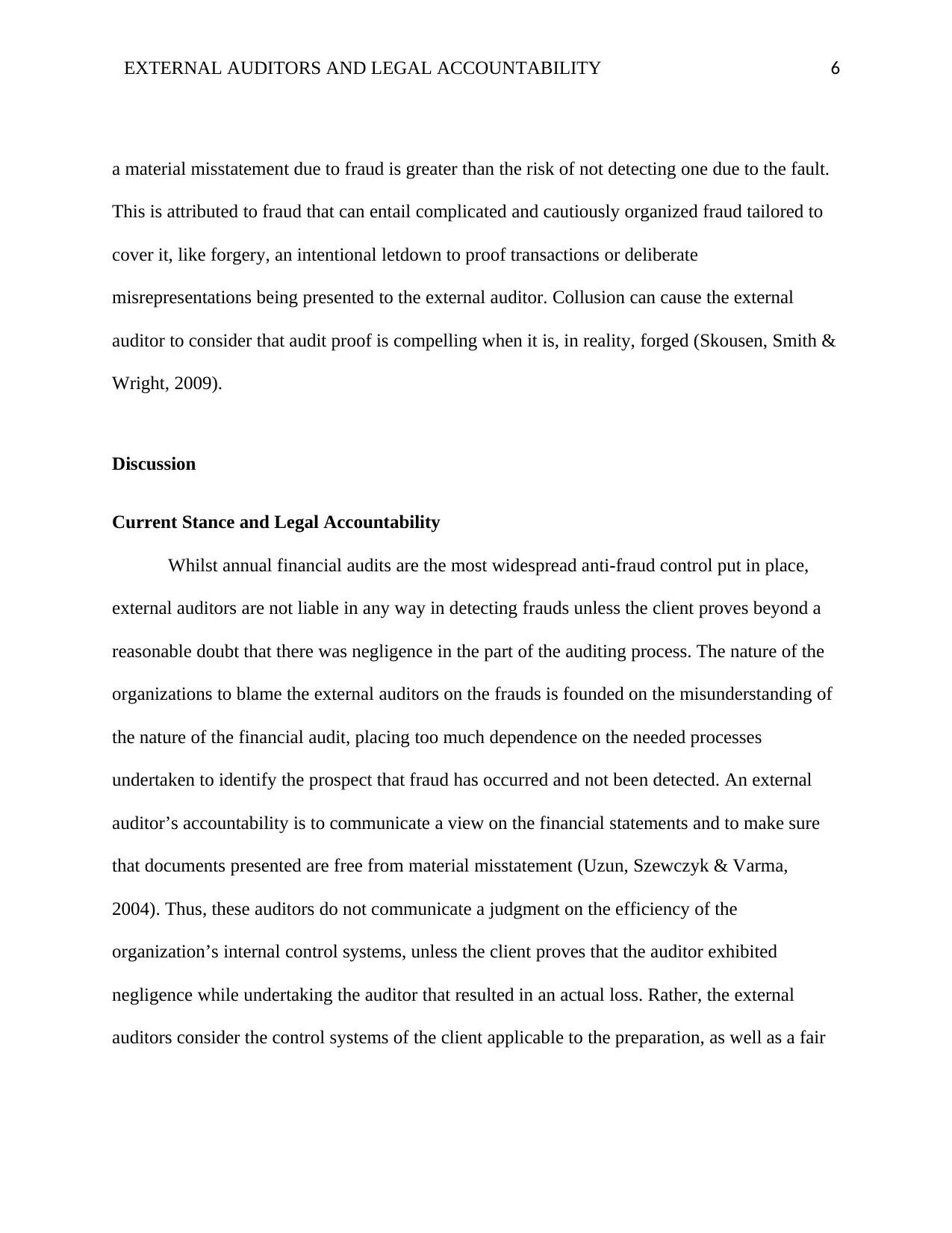
EXTERNAL AUDITORS AND LEGAL ACCOUNTABILITY 6
a material misstatement due to fraud is greater than the risk of not detecting one due to the fault.
This is attributed to fraud that can entail complicated and cautiously organized fraud tailored to
cover it, like forgery, an intentional letdown to proof transactions or deliberate
misrepresentations being presented to the external auditor. Collusion can cause the external
auditor to consider that audit proof is compelling when it is, in reality, forged (Skousen, Smith &
Wright, 2009).
Discussion
Current Stance and Legal Accountability
Whilst annual financial audits are the most widespread anti-fraud control put in place,
external auditors are not liable in any way in detecting frauds unless the client proves beyond a
reasonable doubt that there was negligence in the part of the auditing process. The nature of the
organizations to blame the external auditors on the frauds is founded on the misunderstanding of
the nature of the financial audit, placing too much dependence on the needed processes
undertaken to identify the prospect that fraud has occurred and not been detected. An external
auditor’s accountability is to communicate a view on the financial statements and to make sure
that documents presented are free from material misstatement (Uzun, Szewczyk & Varma,
2004). Thus, these auditors do not communicate a judgment on the efficiency of the
organization’s internal control systems, unless the client proves that the auditor exhibited
negligence while undertaking the auditor that resulted in an actual loss. Rather, the external
auditors consider the control systems of the client applicable to the preparation, as well as a fair
a material misstatement due to fraud is greater than the risk of not detecting one due to the fault.
This is attributed to fraud that can entail complicated and cautiously organized fraud tailored to
cover it, like forgery, an intentional letdown to proof transactions or deliberate
misrepresentations being presented to the external auditor. Collusion can cause the external
auditor to consider that audit proof is compelling when it is, in reality, forged (Skousen, Smith &
Wright, 2009).
Discussion
Current Stance and Legal Accountability
Whilst annual financial audits are the most widespread anti-fraud control put in place,
external auditors are not liable in any way in detecting frauds unless the client proves beyond a
reasonable doubt that there was negligence in the part of the auditing process. The nature of the
organizations to blame the external auditors on the frauds is founded on the misunderstanding of
the nature of the financial audit, placing too much dependence on the needed processes
undertaken to identify the prospect that fraud has occurred and not been detected. An external
auditor’s accountability is to communicate a view on the financial statements and to make sure
that documents presented are free from material misstatement (Uzun, Szewczyk & Varma,
2004). Thus, these auditors do not communicate a judgment on the efficiency of the
organization’s internal control systems, unless the client proves that the auditor exhibited
negligence while undertaking the auditor that resulted in an actual loss. Rather, the external
auditors consider the control systems of the client applicable to the preparation, as well as a fair
⊘ This is a preview!⊘
Do you want full access?
Subscribe today to unlock all pages.

Trusted by 1+ million students worldwide
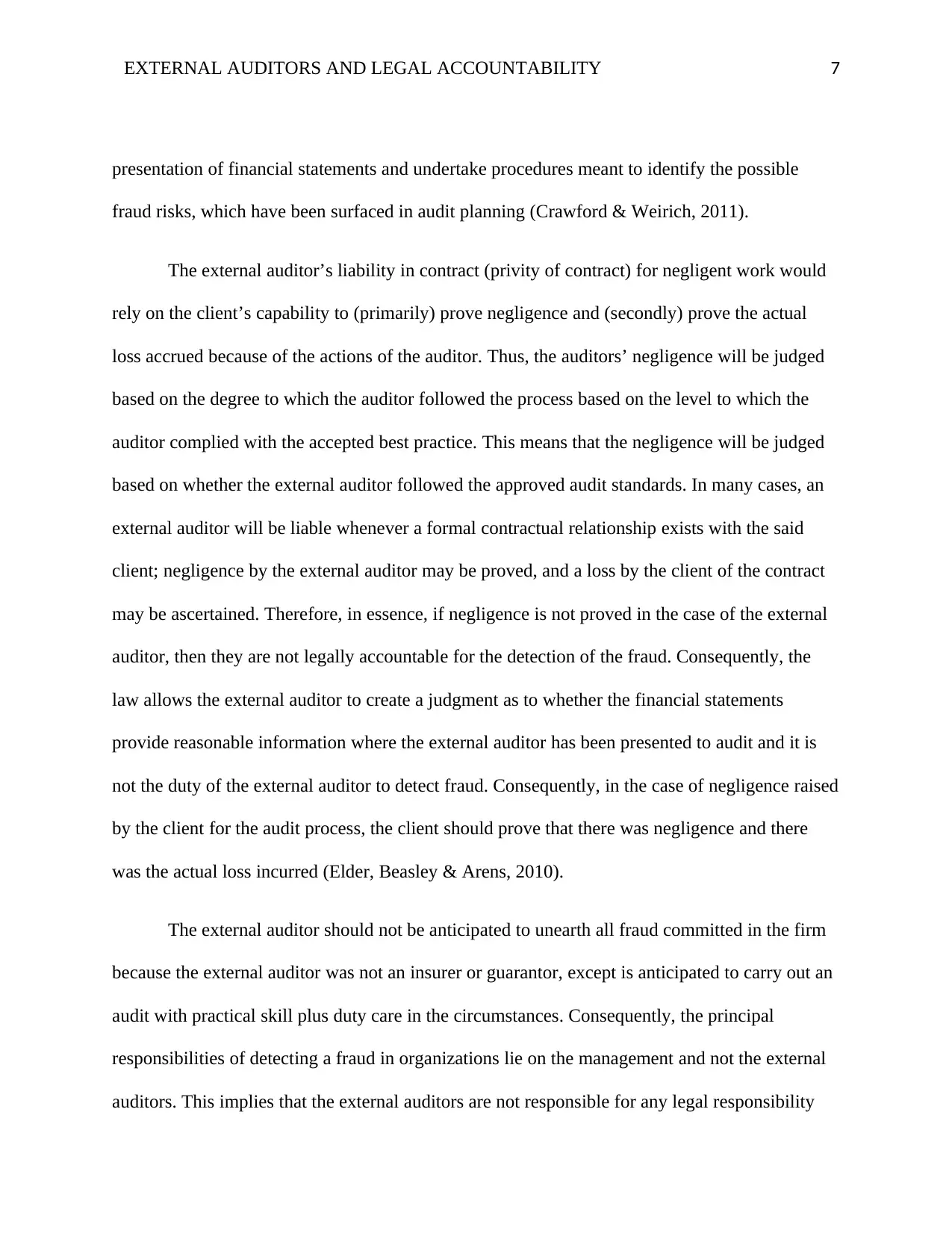
EXTERNAL AUDITORS AND LEGAL ACCOUNTABILITY 7
presentation of financial statements and undertake procedures meant to identify the possible
fraud risks, which have been surfaced in audit planning (Crawford & Weirich, 2011).
The external auditor’s liability in contract (privity of contract) for negligent work would
rely on the client’s capability to (primarily) prove negligence and (secondly) prove the actual
loss accrued because of the actions of the auditor. Thus, the auditors’ negligence will be judged
based on the degree to which the auditor followed the process based on the level to which the
auditor complied with the accepted best practice. This means that the negligence will be judged
based on whether the external auditor followed the approved audit standards. In many cases, an
external auditor will be liable whenever a formal contractual relationship exists with the said
client; negligence by the external auditor may be proved, and a loss by the client of the contract
may be ascertained. Therefore, in essence, if negligence is not proved in the case of the external
auditor, then they are not legally accountable for the detection of the fraud. Consequently, the
law allows the external auditor to create a judgment as to whether the financial statements
provide reasonable information where the external auditor has been presented to audit and it is
not the duty of the external auditor to detect fraud. Consequently, in the case of negligence raised
by the client for the audit process, the client should prove that there was negligence and there
was the actual loss incurred (Elder, Beasley & Arens, 2010).
The external auditor should not be anticipated to unearth all fraud committed in the firm
because the external auditor was not an insurer or guarantor, except is anticipated to carry out an
audit with practical skill plus duty care in the circumstances. Consequently, the principal
responsibilities of detecting a fraud in organizations lie on the management and not the external
auditors. This implies that the external auditors are not responsible for any legal responsibility
presentation of financial statements and undertake procedures meant to identify the possible
fraud risks, which have been surfaced in audit planning (Crawford & Weirich, 2011).
The external auditor’s liability in contract (privity of contract) for negligent work would
rely on the client’s capability to (primarily) prove negligence and (secondly) prove the actual
loss accrued because of the actions of the auditor. Thus, the auditors’ negligence will be judged
based on the degree to which the auditor followed the process based on the level to which the
auditor complied with the accepted best practice. This means that the negligence will be judged
based on whether the external auditor followed the approved audit standards. In many cases, an
external auditor will be liable whenever a formal contractual relationship exists with the said
client; negligence by the external auditor may be proved, and a loss by the client of the contract
may be ascertained. Therefore, in essence, if negligence is not proved in the case of the external
auditor, then they are not legally accountable for the detection of the fraud. Consequently, the
law allows the external auditor to create a judgment as to whether the financial statements
provide reasonable information where the external auditor has been presented to audit and it is
not the duty of the external auditor to detect fraud. Consequently, in the case of negligence raised
by the client for the audit process, the client should prove that there was negligence and there
was the actual loss incurred (Elder, Beasley & Arens, 2010).
The external auditor should not be anticipated to unearth all fraud committed in the firm
because the external auditor was not an insurer or guarantor, except is anticipated to carry out an
audit with practical skill plus duty care in the circumstances. Consequently, the principal
responsibilities of detecting a fraud in organizations lie on the management and not the external
auditors. This implies that the external auditors are not responsible for any legal responsibility
Paraphrase This Document
Need a fresh take? Get an instant paraphrase of this document with our AI Paraphraser
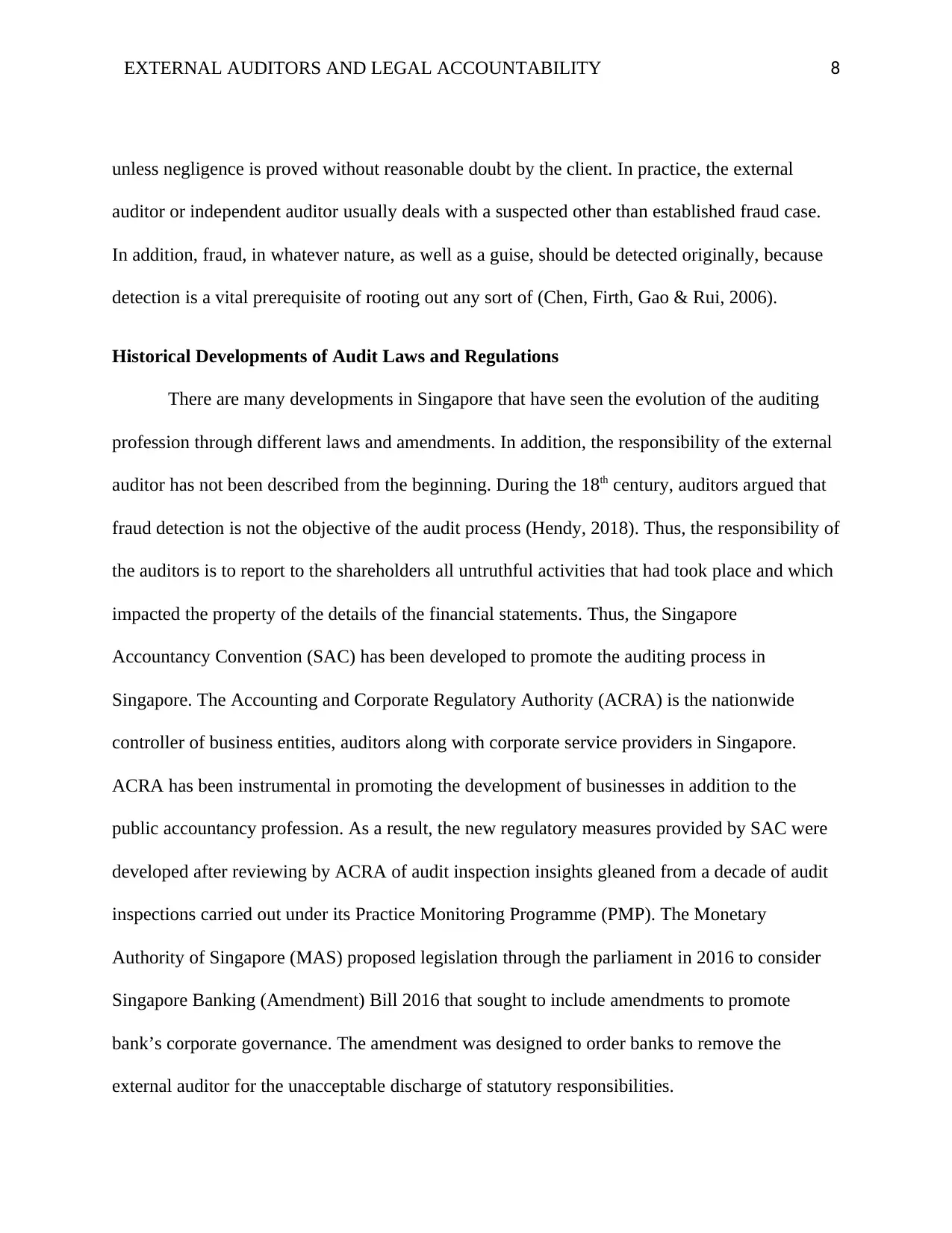
EXTERNAL AUDITORS AND LEGAL ACCOUNTABILITY 8
unless negligence is proved without reasonable doubt by the client. In practice, the external
auditor or independent auditor usually deals with a suspected other than established fraud case.
In addition, fraud, in whatever nature, as well as a guise, should be detected originally, because
detection is a vital prerequisite of rooting out any sort of (Chen, Firth, Gao & Rui, 2006).
Historical Developments of Audit Laws and Regulations
There are many developments in Singapore that have seen the evolution of the auditing
profession through different laws and amendments. In addition, the responsibility of the external
auditor has not been described from the beginning. During the 18th century, auditors argued that
fraud detection is not the objective of the audit process (Hendy, 2018). Thus, the responsibility of
the auditors is to report to the shareholders all untruthful activities that had took place and which
impacted the property of the details of the financial statements. Thus, the Singapore
Accountancy Convention (SAC) has been developed to promote the auditing process in
Singapore. The Accounting and Corporate Regulatory Authority (ACRA) is the nationwide
controller of business entities, auditors along with corporate service providers in Singapore.
ACRA has been instrumental in promoting the development of businesses in addition to the
public accountancy profession. As a result, the new regulatory measures provided by SAC were
developed after reviewing by ACRA of audit inspection insights gleaned from a decade of audit
inspections carried out under its Practice Monitoring Programme (PMP). The Monetary
Authority of Singapore (MAS) proposed legislation through the parliament in 2016 to consider
Singapore Banking (Amendment) Bill 2016 that sought to include amendments to promote
bank’s corporate governance. The amendment was designed to order banks to remove the
external auditor for the unacceptable discharge of statutory responsibilities.
unless negligence is proved without reasonable doubt by the client. In practice, the external
auditor or independent auditor usually deals with a suspected other than established fraud case.
In addition, fraud, in whatever nature, as well as a guise, should be detected originally, because
detection is a vital prerequisite of rooting out any sort of (Chen, Firth, Gao & Rui, 2006).
Historical Developments of Audit Laws and Regulations
There are many developments in Singapore that have seen the evolution of the auditing
profession through different laws and amendments. In addition, the responsibility of the external
auditor has not been described from the beginning. During the 18th century, auditors argued that
fraud detection is not the objective of the audit process (Hendy, 2018). Thus, the responsibility of
the auditors is to report to the shareholders all untruthful activities that had took place and which
impacted the property of the details of the financial statements. Thus, the Singapore
Accountancy Convention (SAC) has been developed to promote the auditing process in
Singapore. The Accounting and Corporate Regulatory Authority (ACRA) is the nationwide
controller of business entities, auditors along with corporate service providers in Singapore.
ACRA has been instrumental in promoting the development of businesses in addition to the
public accountancy profession. As a result, the new regulatory measures provided by SAC were
developed after reviewing by ACRA of audit inspection insights gleaned from a decade of audit
inspections carried out under its Practice Monitoring Programme (PMP). The Monetary
Authority of Singapore (MAS) proposed legislation through the parliament in 2016 to consider
Singapore Banking (Amendment) Bill 2016 that sought to include amendments to promote
bank’s corporate governance. The amendment was designed to order banks to remove the
external auditor for the unacceptable discharge of statutory responsibilities.
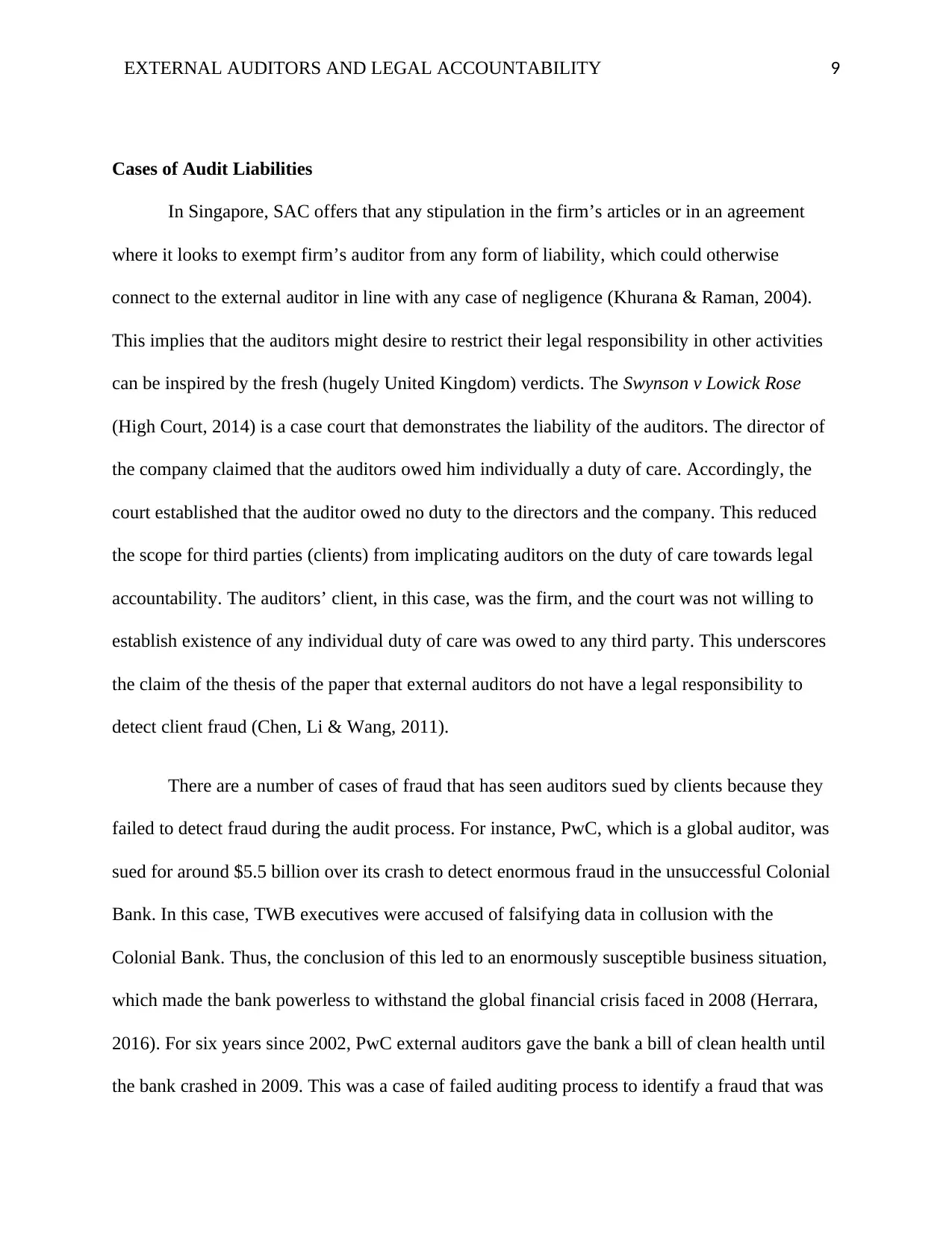
EXTERNAL AUDITORS AND LEGAL ACCOUNTABILITY 9
Cases of Audit Liabilities
In Singapore, SAC offers that any stipulation in the firm’s articles or in an agreement
where it looks to exempt firm’s auditor from any form of liability, which could otherwise
connect to the external auditor in line with any case of negligence (Khurana & Raman, 2004).
This implies that the auditors might desire to restrict their legal responsibility in other activities
can be inspired by the fresh (hugely United Kingdom) verdicts. The Swynson v Lowick Rose
(High Court, 2014) is a case court that demonstrates the liability of the auditors. The director of
the company claimed that the auditors owed him individually a duty of care. Accordingly, the
court established that the auditor owed no duty to the directors and the company. This reduced
the scope for third parties (clients) from implicating auditors on the duty of care towards legal
accountability. The auditors’ client, in this case, was the firm, and the court was not willing to
establish existence of any individual duty of care was owed to any third party. This underscores
the claim of the thesis of the paper that external auditors do not have a legal responsibility to
detect client fraud (Chen, Li & Wang, 2011).
There are a number of cases of fraud that has seen auditors sued by clients because they
failed to detect fraud during the audit process. For instance, PwC, which is a global auditor, was
sued for around $5.5 billion over its crash to detect enormous fraud in the unsuccessful Colonial
Bank. In this case, TWB executives were accused of falsifying data in collusion with the
Colonial Bank. Thus, the conclusion of this led to an enormously susceptible business situation,
which made the bank powerless to withstand the global financial crisis faced in 2008 (Herrara,
2016). For six years since 2002, PwC external auditors gave the bank a bill of clean health until
the bank crashed in 2009. This was a case of failed auditing process to identify a fraud that was
Cases of Audit Liabilities
In Singapore, SAC offers that any stipulation in the firm’s articles or in an agreement
where it looks to exempt firm’s auditor from any form of liability, which could otherwise
connect to the external auditor in line with any case of negligence (Khurana & Raman, 2004).
This implies that the auditors might desire to restrict their legal responsibility in other activities
can be inspired by the fresh (hugely United Kingdom) verdicts. The Swynson v Lowick Rose
(High Court, 2014) is a case court that demonstrates the liability of the auditors. The director of
the company claimed that the auditors owed him individually a duty of care. Accordingly, the
court established that the auditor owed no duty to the directors and the company. This reduced
the scope for third parties (clients) from implicating auditors on the duty of care towards legal
accountability. The auditors’ client, in this case, was the firm, and the court was not willing to
establish existence of any individual duty of care was owed to any third party. This underscores
the claim of the thesis of the paper that external auditors do not have a legal responsibility to
detect client fraud (Chen, Li & Wang, 2011).
There are a number of cases of fraud that has seen auditors sued by clients because they
failed to detect fraud during the audit process. For instance, PwC, which is a global auditor, was
sued for around $5.5 billion over its crash to detect enormous fraud in the unsuccessful Colonial
Bank. In this case, TWB executives were accused of falsifying data in collusion with the
Colonial Bank. Thus, the conclusion of this led to an enormously susceptible business situation,
which made the bank powerless to withstand the global financial crisis faced in 2008 (Herrara,
2016). For six years since 2002, PwC external auditors gave the bank a bill of clean health until
the bank crashed in 2009. This was a case of failed auditing process to identify a fraud that was
⊘ This is a preview!⊘
Do you want full access?
Subscribe today to unlock all pages.

Trusted by 1+ million students worldwide
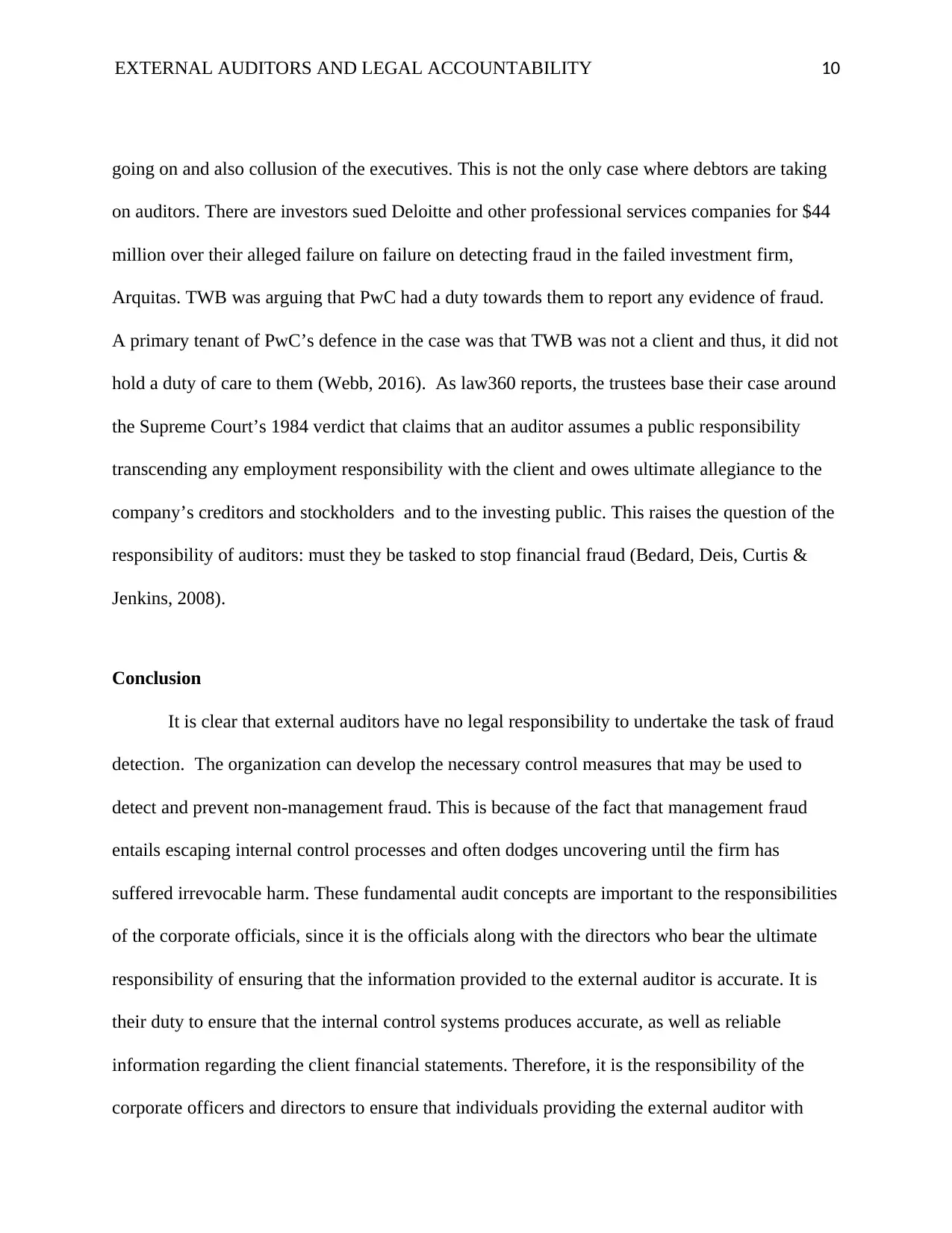
EXTERNAL AUDITORS AND LEGAL ACCOUNTABILITY 10
going on and also collusion of the executives. This is not the only case where debtors are taking
on auditors. There are investors sued Deloitte and other professional services companies for $44
million over their alleged failure on failure on detecting fraud in the failed investment firm,
Arquitas. TWB was arguing that PwC had a duty towards them to report any evidence of fraud.
A primary tenant of PwC’s defence in the case was that TWB was not a client and thus, it did not
hold a duty of care to them (Webb, 2016). As law360 reports, the trustees base their case around
the Supreme Court’s 1984 verdict that claims that an auditor assumes a public responsibility
transcending any employment responsibility with the client and owes ultimate allegiance to the
company’s creditors and stockholders and to the investing public. This raises the question of the
responsibility of auditors: must they be tasked to stop financial fraud (Bedard, Deis, Curtis &
Jenkins, 2008).
Conclusion
It is clear that external auditors have no legal responsibility to undertake the task of fraud
detection. The organization can develop the necessary control measures that may be used to
detect and prevent non-management fraud. This is because of the fact that management fraud
entails escaping internal control processes and often dodges uncovering until the firm has
suffered irrevocable harm. These fundamental audit concepts are important to the responsibilities
of the corporate officials, since it is the officials along with the directors who bear the ultimate
responsibility of ensuring that the information provided to the external auditor is accurate. It is
their duty to ensure that the internal control systems produces accurate, as well as reliable
information regarding the client financial statements. Therefore, it is the responsibility of the
corporate officers and directors to ensure that individuals providing the external auditor with
going on and also collusion of the executives. This is not the only case where debtors are taking
on auditors. There are investors sued Deloitte and other professional services companies for $44
million over their alleged failure on failure on detecting fraud in the failed investment firm,
Arquitas. TWB was arguing that PwC had a duty towards them to report any evidence of fraud.
A primary tenant of PwC’s defence in the case was that TWB was not a client and thus, it did not
hold a duty of care to them (Webb, 2016). As law360 reports, the trustees base their case around
the Supreme Court’s 1984 verdict that claims that an auditor assumes a public responsibility
transcending any employment responsibility with the client and owes ultimate allegiance to the
company’s creditors and stockholders and to the investing public. This raises the question of the
responsibility of auditors: must they be tasked to stop financial fraud (Bedard, Deis, Curtis &
Jenkins, 2008).
Conclusion
It is clear that external auditors have no legal responsibility to undertake the task of fraud
detection. The organization can develop the necessary control measures that may be used to
detect and prevent non-management fraud. This is because of the fact that management fraud
entails escaping internal control processes and often dodges uncovering until the firm has
suffered irrevocable harm. These fundamental audit concepts are important to the responsibilities
of the corporate officials, since it is the officials along with the directors who bear the ultimate
responsibility of ensuring that the information provided to the external auditor is accurate. It is
their duty to ensure that the internal control systems produces accurate, as well as reliable
information regarding the client financial statements. Therefore, it is the responsibility of the
corporate officers and directors to ensure that individuals providing the external auditor with
Paraphrase This Document
Need a fresh take? Get an instant paraphrase of this document with our AI Paraphraser
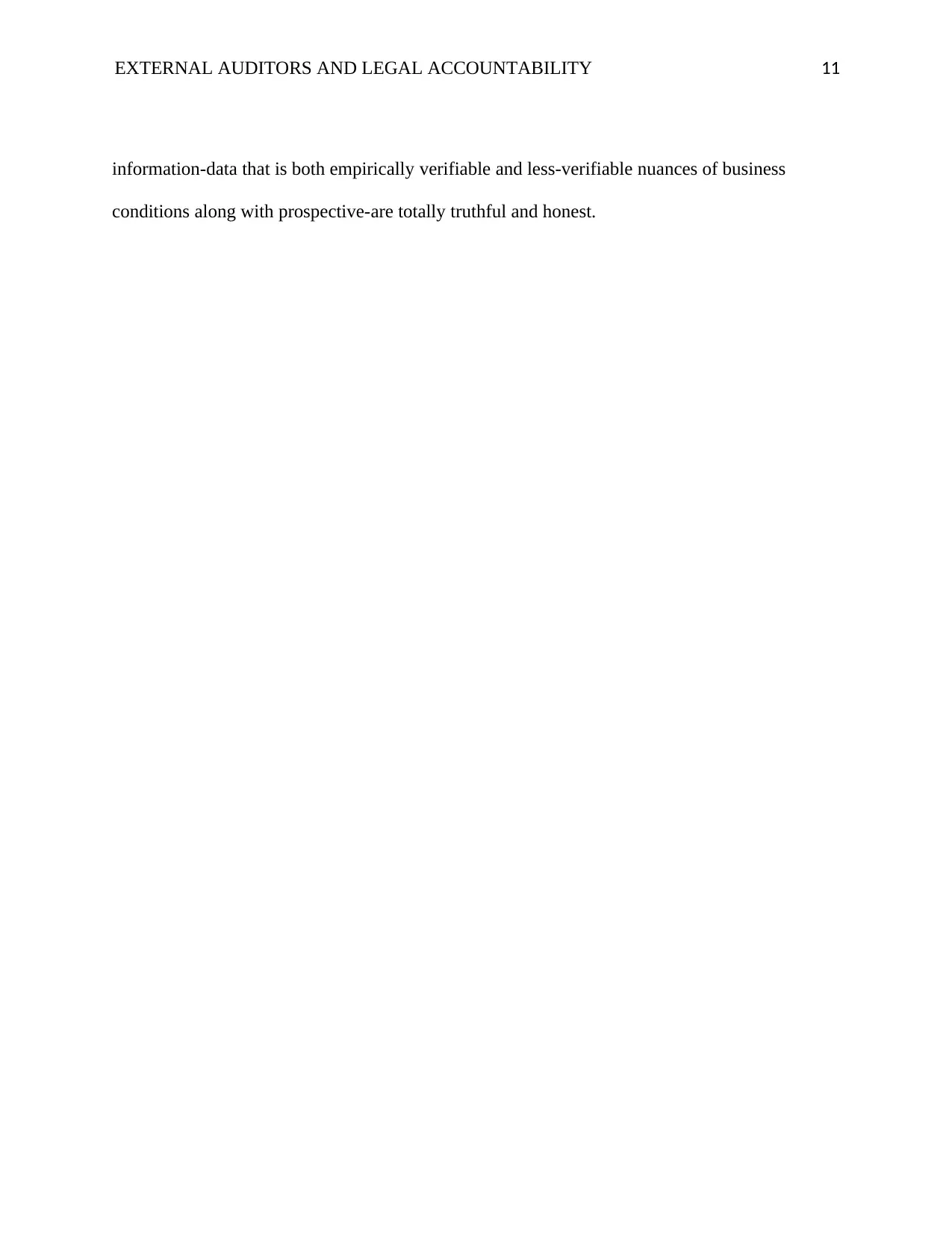
EXTERNAL AUDITORS AND LEGAL ACCOUNTABILITY 11
information-data that is both empirically verifiable and less-verifiable nuances of business
conditions along with prospective-are totally truthful and honest.
information-data that is both empirically verifiable and less-verifiable nuances of business
conditions along with prospective-are totally truthful and honest.
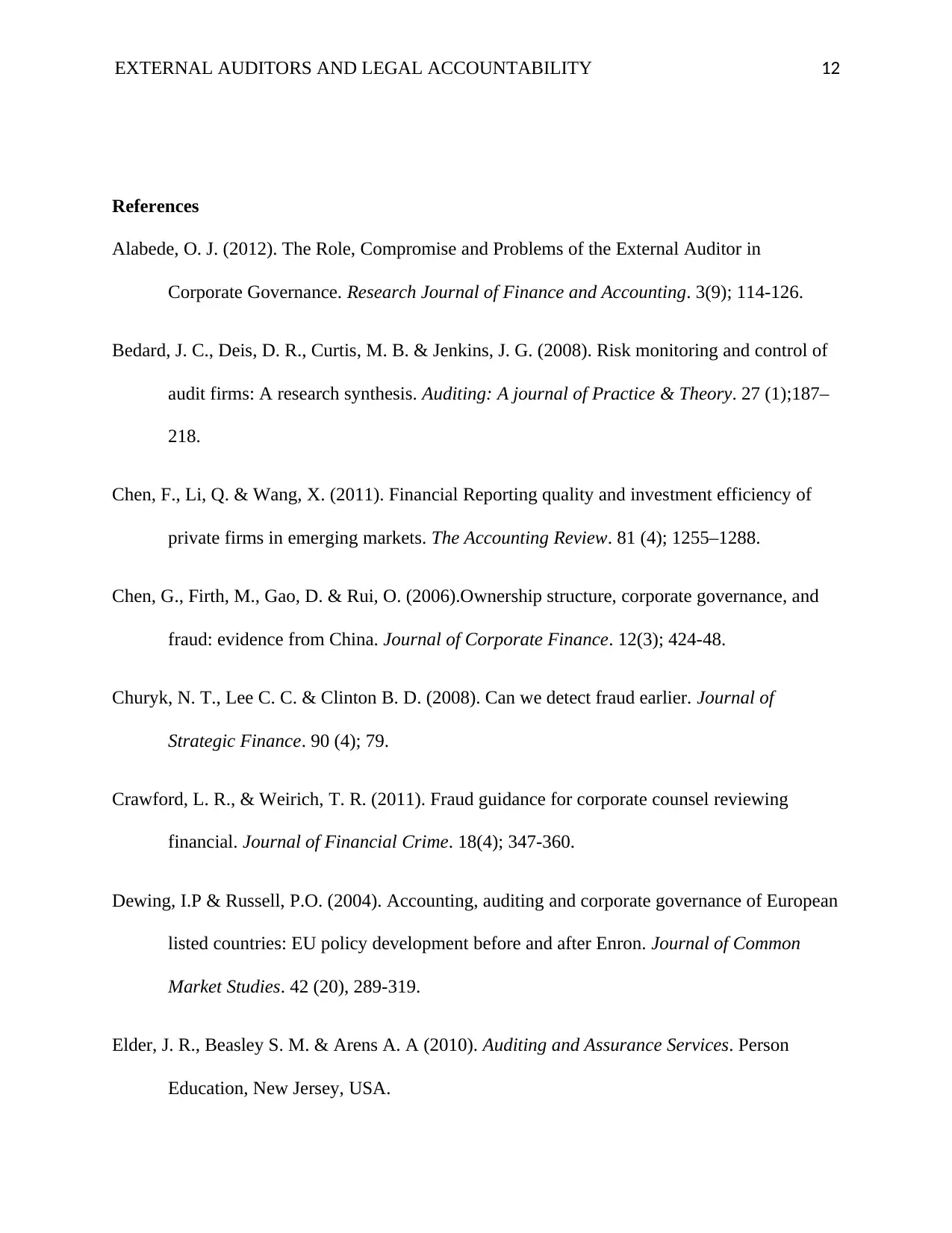
EXTERNAL AUDITORS AND LEGAL ACCOUNTABILITY 12
References
Alabede, O. J. (2012). The Role, Compromise and Problems of the External Auditor in
Corporate Governance. Research Journal of Finance and Accounting. 3(9); 114-126.
Bedard, J. C., Deis, D. R., Curtis, M. B. & Jenkins, J. G. (2008). Risk monitoring and control of
audit firms: A research synthesis. Auditing: A journal of Practice & Theory. 27 (1);187–
218.
Chen, F., Li, Q. & Wang, X. (2011). Financial Reporting quality and investment efficiency of
private firms in emerging markets. The Accounting Review. 81 (4); 1255–1288.
Chen, G., Firth, M., Gao, D. & Rui, O. (2006).Ownership structure, corporate governance, and
fraud: evidence from China. Journal of Corporate Finance. 12(3); 424-48.
Churyk, N. T., Lee C. C. & Clinton B. D. (2008). Can we detect fraud earlier. Journal of
Strategic Finance. 90 (4); 79.
Crawford, L. R., & Weirich, T. R. (2011). Fraud guidance for corporate counsel reviewing
financial. Journal of Financial Crime. 18(4); 347-360.
Dewing, I.P & Russell, P.O. (2004). Accounting, auditing and corporate governance of European
listed countries: EU policy development before and after Enron. Journal of Common
Market Studies. 42 (20), 289-319.
Elder, J. R., Beasley S. M. & Arens A. A (2010). Auditing and Assurance Services. Person
Education, New Jersey, USA.
References
Alabede, O. J. (2012). The Role, Compromise and Problems of the External Auditor in
Corporate Governance. Research Journal of Finance and Accounting. 3(9); 114-126.
Bedard, J. C., Deis, D. R., Curtis, M. B. & Jenkins, J. G. (2008). Risk monitoring and control of
audit firms: A research synthesis. Auditing: A journal of Practice & Theory. 27 (1);187–
218.
Chen, F., Li, Q. & Wang, X. (2011). Financial Reporting quality and investment efficiency of
private firms in emerging markets. The Accounting Review. 81 (4); 1255–1288.
Chen, G., Firth, M., Gao, D. & Rui, O. (2006).Ownership structure, corporate governance, and
fraud: evidence from China. Journal of Corporate Finance. 12(3); 424-48.
Churyk, N. T., Lee C. C. & Clinton B. D. (2008). Can we detect fraud earlier. Journal of
Strategic Finance. 90 (4); 79.
Crawford, L. R., & Weirich, T. R. (2011). Fraud guidance for corporate counsel reviewing
financial. Journal of Financial Crime. 18(4); 347-360.
Dewing, I.P & Russell, P.O. (2004). Accounting, auditing and corporate governance of European
listed countries: EU policy development before and after Enron. Journal of Common
Market Studies. 42 (20), 289-319.
Elder, J. R., Beasley S. M. & Arens A. A (2010). Auditing and Assurance Services. Person
Education, New Jersey, USA.
⊘ This is a preview!⊘
Do you want full access?
Subscribe today to unlock all pages.

Trusted by 1+ million students worldwide
1 out of 14
Related Documents
Your All-in-One AI-Powered Toolkit for Academic Success.
+13062052269
info@desklib.com
Available 24*7 on WhatsApp / Email
![[object Object]](/_next/static/media/star-bottom.7253800d.svg)
Unlock your academic potential
Copyright © 2020–2026 A2Z Services. All Rights Reserved. Developed and managed by ZUCOL.





